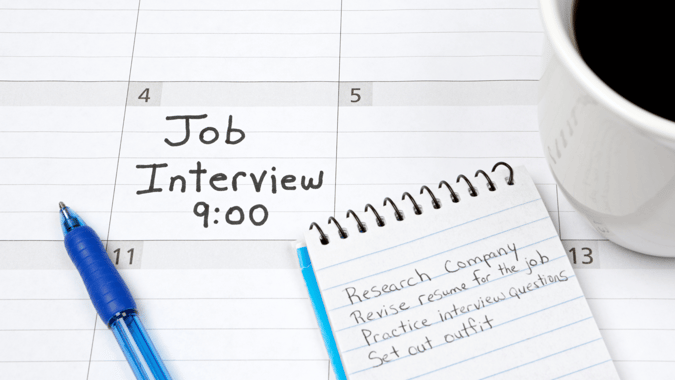
Preparing for an interview
By: Natalie Rogers

It is essential to adequately prepare for all interviews, whether you are meeting with a future employer or a recruitment consultant. You must be able to clearly articulate your achievements, why you want to change jobs, the type of role you are looking for and what your goals are.
Prior to attending the interview
-
Ensure you research the organisation you are meeting with and understand what their business is about. Look at the company's website and Google them to find out who their competitors are and any other information that might be relevant such as products and services, market share, financial situation as well as positioning, location and size of the organisation.
-
Make sure you have a detailed position description well in advance of the interview. If you haven't been given one, ask your consultant to provide you with one. For each responsibility or attribute listed in the position description, prepare responses as to how your skills and knowledge can add value to the role and the organisation. Think about specific examples and back it up with results.
-
Know the exact location of the interview and how you plan to get there. If you are taking public transport allow an extra 30 minutes for delays. Know the full name, pronunciation and title of the interviewer.
-
Prepare a list of questions you have about the company and the role. An interview is an opportunity for both you and the employer to make an informed decision about your suitability for the role. Asking questions is also a way to let the interviewer know that you are interested in the role and the company.
The interview process
First impressions are critical to your success. Research shows that a first impression is made within the first eight seconds of a meeting. It is important to be respectful, polite and attentive. It goes without saying that you should be extremely well presented and arrive on time. (Don't arrive too early. This can be off-putting for an interviewer who may be tied up in other meetings).
Behavioural Based Interviews (BBI) are the most common style of interviewing used today and requires you to draw on past experience and describe specific examples of events that demonstrate your competence.
The most effective way of answering these types of questions is to use the following technique:
1. Situation
What was the specific situation? Give an example that happened in the past.
2. Process
What was the process you went through to resolve the situation?
3. Outcome
What was the outcome or result you achieved and what were your key learnings?
If you have spent the time to develop a career plan and also have a clear resume with well thought out achievements, you should have no problem drawing out specific examples. You should be clear on positioning your strengths, areas for development and how to sell yourself in a concise way.
Make sure to download our free resume template. It's been designed by our recruitment specialists and is in the right format so it can be read by Applicant Tracking Systems (ATS).
Other tips for successful interviewing
-
Avoid answering questions by describing "how you would" do something. As per the SITUATION, PROCESS, OUTCOME technique of answering questions, describe "how you actually did" something in the past. Use numbers, revenues or percentages to help illustrate your answer.
-
Answer with conviction.
-
Speak with clarity and confidence.
-
To ascertain how prepared you are for the interview, read through our Final Checklist Before Interviewing
-
Prepare answers to potential interview questions before the interview.
View these sample interview questions.
Related


Stay ahead of the EOY crunch with contracting
Even though December comes around the same time every year, somehow it still manages to hit us with...
.jpg?width=352&name=FMCG%20Sales%20-%20Blog%20(3).jpg)
FMCG Sales: 2025 Trends & Hiring Challenges
In a market defined by consolidation, and caution, FMCG Sales leaders are facing increased pressure...

 Accessibility
Accessibility
